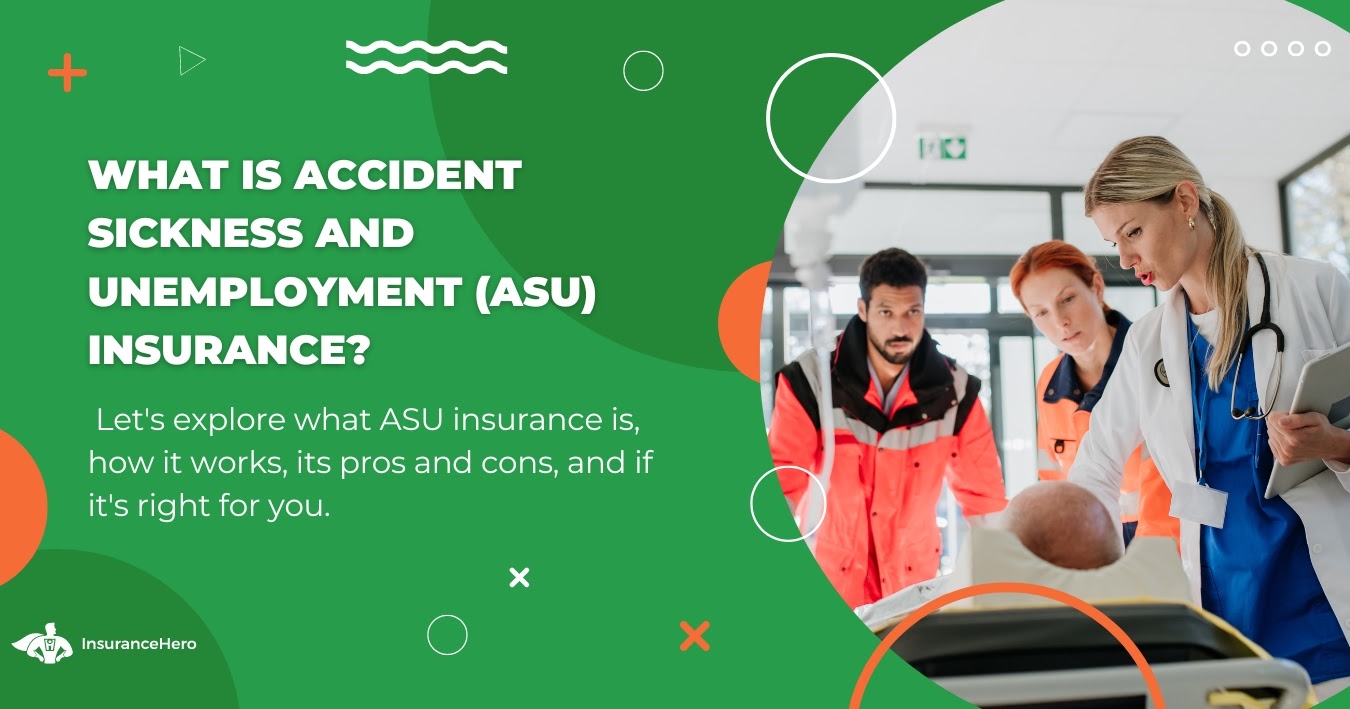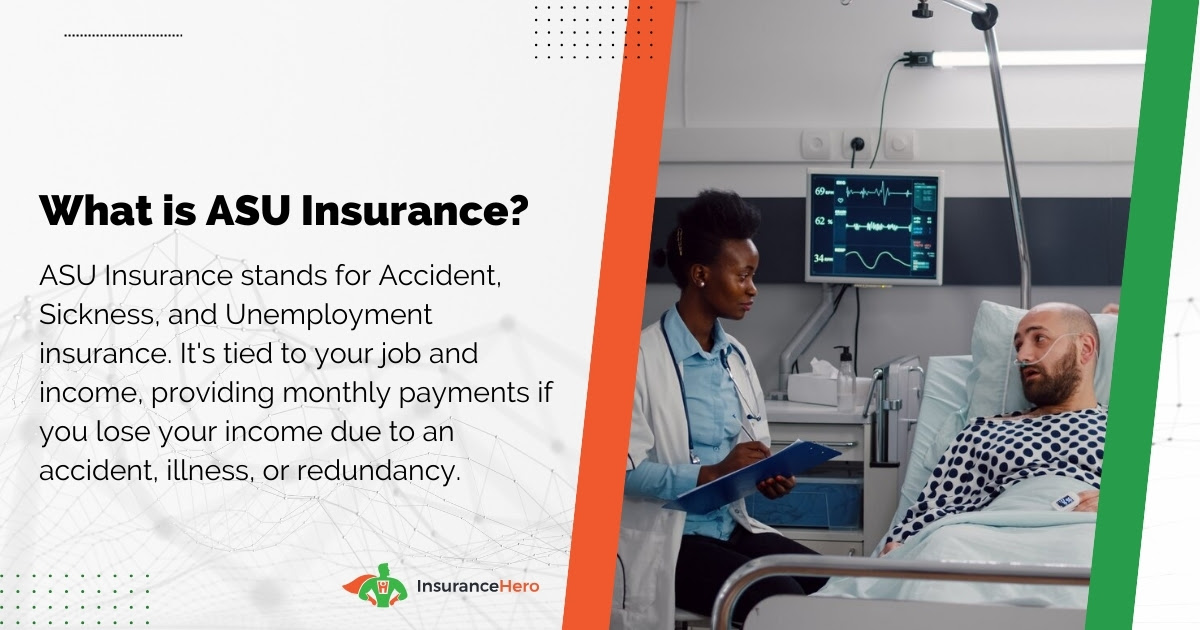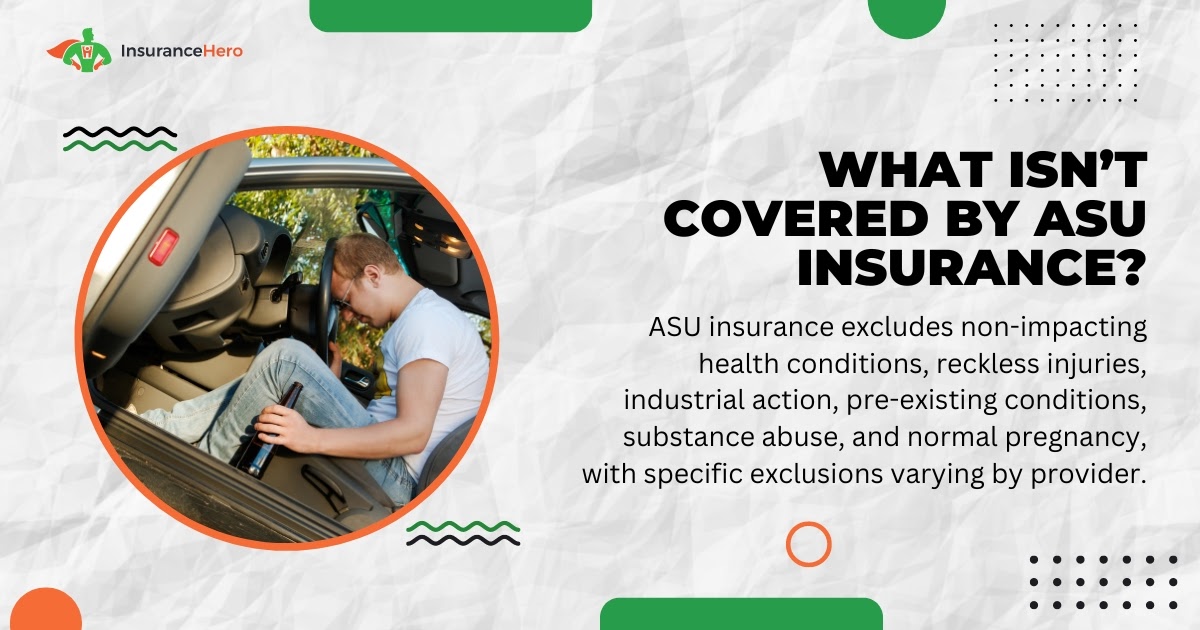What Is Accident Sickness And Unemployment Insurance (ASU)?

When it comes to safeguarding your family and your future, two major transition points matter.
The first is any event that causes you to lose your source of income; the second is your death. Your death is covered by life insurance, which we’ve written extensively about throughout this site.
The first can be covered by some kind of income protection or ASU insurance.
So, today, let’s talk more about what ASU insurance is, how it works, its benefits and drawbacks, and whether or not you should get it.
ASU Insurance In Summary:
When it comes to protecting your family and your future, losing your income can be just as critical as your death. While life insurance covers your death, ASU (Accident, Sickness, and Unemployment) insurance protects your income.
At Insurance Hero, we specialise in providing ASU insurance tailored to your needs.
Here’s why it’s worth considering:
- Income Protection: Provides regular monthly payments if you lose your income due to an accident, illness, or redundancy.
- Percentage Coverage: Typically covers up to 70% of your previous income.
- Tax-Free Payments: Benefits are tax-free.
- Flexible Eligibility: Available for UK residents, including contractors and self-employed individuals.
Get ASU And Income Protection Quotes From The UK’s Top Companies


What is ASU Insurance?
ASU Insurance, also known as Accident, Sickness, and Unemployment Insurance, is a form of insurance. It’s a product you purchase that is tied to your current job and income.
If you then suffer from an accident, come down with an illness, or are made redundant at your job – all events that would cost you your income – you can file a claim on your insurance.
If the claim is approved, you will be given regular monthly payments for some time, depending on the insurance type, the claim, and your job situation.
First, ASU insurance can be somewhat limited. It typically only covers a percentage of your previous income, usually no more than 70%.
While that can be enough to live on for a short term, it might not be enough if you’re left unable to work for the long term.
On the other hand, ASU insurance provides monthly benefits while a claim is active, rather than a single lump-sum payment.
This helps you maintain your standard of living without having to manage a sudden, fixed amount of income.
As an added benefit, ASU insurance payments are tax-free; the number you get is the number you get, without the government skimming anything off the top.
To qualify for ASU insurance, you must clear a few barriers, though they’re quite low. You have to be a resident of the UK, over the age of 18, and working at least 15 hours in full or part-time employment.
You generally also have to be registered with a UK doctor who will verify any accident or sickness for your insurer, and you have to have worked for the past year to qualify.
You can still get ASU insurance if you’re a contractor or self-employed. There are also more details to cover, so let’s explore those further.

What is Covered by ASU Insurance?
ASU insurance covers you. More specifically, it covers your income. Suppose an accident, an illness, or a cause of unemployment, such as redundancy, causes you to lose your source of income.
In that case, you can file a claim against your insurance and receive payments while you work on healing from that accident, recovering from that sickness, or seeking a new job.
ASU insurance can be either short-term or long-term. In general, short-term policies cover you for 1-2 years, after which you can no longer receive benefits until you recover your income and reset the clock.
Long-term cover, on the other hand, will pay you indefinitely; the caveat is that it usually only covers accident and sickness, not unemployment.
There are also three different kinds of ASU insurance:
- Any Occupation ASU Insurance. This is the most restrictive but also the cheapest kind of ASU insurance. It will only cover you if you cannot work in any occupation.
- Suited Occupation ASU Insurance. This is the middle ground for ASU insurance. Given your skills, job history, and training, it will pay out if you cannot work in your chosen field or a suitable occupation. You may still be employable in other roles – virtually anyone can work as a cashier – but this form of ASU will still pay out.
- Own Occupation ASU Insurance. This form of ASU insurance will cover you if you cannot work in your specific occupation or if you’re made redundant and cannot return to your job. It’s the easiest to claim but usually the most expensive.
The details of these kinds of cover will vary as well. In particular, what constitutes a “suited occupation” will depend on your career, job skills, training, and the insurance provider’s definitions of occupations.
Their view of what you can do and your view might be different, which can cause friction and sometimes result in denied claims.

What Isn’t Covered by ASU Insurance?
One of the biggest potential limitations of ASU insurance is the limits on what it will and won’t cover. Here are some of the restrictions on most ASU insurance policies.
Remember that the exact definitions, boundaries, and limitations will depend on the specific policy and that some providers may have better offerings than others. Be sure to shop around to suit your needs.
- Health conditions that don’t impact your income. For example, if you work a desk job and you lose a foot, that foot likely wasn’t critical to your job and doesn’t disqualify you from working in your role, so ASU insurance won’t cover it.
- Reckless or self-inflicted injury. Most forms of ASU specify accidents very narrowly. Something you do out of your own recklessness often won’t be covered. A common example may be injury during extreme sports or recreational activities.
- Industrial action. Also known as going on strike or participating in a walk-out or lock-out, these collective bargaining tactics often leave you with a temporary lack of income, but are not covered by ASU insurance.
- Pre-existing or chronic conditions. Some insurance providers will refuse to cover a known condition when you sign up for coverage; others will add it as an additional rider you can pay for.
- Drug or alcohol abuse. If your abuse of drugs or alcohol causes the accident or sickness, chances are your ASU insurance provider will decline your claim.
- Normal pregnancy and childbirth. ASU insurance doesn’t cover you for a normal pregnancy, but it may cover you if you suffer from an abnormal and dangerous pregnancy.
There are also timing restrictions. The three most common are:
- If you have another source of unemployment support, ASU insurance may not kick in until that support runs out.
- Your policy will have a deferred period, which will be several months after you lose your income, during which you can’t file a claim.
- You usually have to wait at least a year after signing up for cover before you can make a claim. This prevents people from signing up weeks before they know they’ll be made redundant and filing a claim immediately.
While these might sound restrictive, in practice, ASU insurance is relatively flexible, inexpensive, and reliable when needed.

What Are the Benefits of ASU Insurance?
The single most significant benefit of ASU insurance is peace of mind, and the second is the monetary benefit.
Working throughout your career, you will likely experience lean times. Various estimates have indicated that 30-60% of UK households are only one missed paycheque away from disaster.
Think about it. If you miss a cheque and lose a few weeks or months’ worth of income, can you still meet all your financial obligations? Can you afford your rent or mortgage?
Can you afford petrol and transportation fees? Can you afford food? What about the costs of childcare, education, and other services?
While you might be able to cut back for a few weeks and salvage the situation, many people cannot, and falling behind on any of your financial obligations will likely cause you more stress and hardship, which can cascade.
Furthermore, if you’re sick or injured, all of that added stress can delay healing or exacerbate the situation, making it even more difficult to find work and replacement income.
ASU insurance helps protect you from situations like this. If you fall ill or suffer an accident, you can spend your time focused on recovery.
ASU insurance won’t cover your full pay, but even covering most of it will significantly help.
Another benefit of ASU insurance is that once you return to work and return to paying your premiums, it effectively resets.
If you then suffer from another incident or are made redundant, you can file another claim and be paid again. It keeps going as long as you maintain it.

What Are the Drawbacks of ASU Insurance?
ASU insurance has only a few drawbacks, but they can be important depending on your situation.
The first and most common is the limited duration. If you suffer from a permanent injury, disability, or long-term illness, your ASU insurance will likely run out, possibly before you find some other way to bring in income.
Usually, it can be a good stopgap as you transition to disability support and other means of survival, but it does put a firm limitation on your ability to continue living as you have been.
The deferred period can also be a drawback; if your ASU insurance stipulates that it won’t kick in for three months after losing your income, you have to be able to survive those three months.
If you’re not confident in your ability to do so, you can generally opt for a policy with a shorter deferred period.
Some people also consider it a drawback to purchase insurance and never need to make a claim against it.
While yes, technically, this means you’ve “wasted” the insurance if you reach retirement without needing it, it also means you never experienced a sudden and unexpected job loss, accident, or illness and had peace of mind throughout, even if you didn’t need it. That’s usually worth the price.

Are There Alternatives to ASU Insurance?
Yes, there are, and below we list them with brief explanations of how each one works.
Here are some of the other options:
- Accident and Sickness Insurance. This is like ASU insurance, but doesn’t cover unemployment through other means, like redundancy.
- Income Protection Insurance is a more comprehensive kind of income replacement insurance with fewer restrictions on when a claim can be made.
- Mortgage Payment Protection Insurance. This is an insurance product pegged to the value of your mortgage. It will simply cover the payment for a limited time if you cannot make it.
- Unemployment Insurance. Your workplace frequently offers this insurance product, which will serve as a counterpart to Accident and Sickness insurance if you don’t have full ASU insurance.
There are also some forms of government support. Depending on the nature of your loss of income, you may be able to receive money from the UK government in the form of Statutory Sick Pay, the Jobseeker’s Allowance, Universal Credit, or a disability support program if your injury or illness is determined to be permanent.
We have written a comprehensive guide to income protection and redundancy, which could be helpful to you.

Should You Get ASU Insurance?
While we would like to say yes, of course you should, the answer isn’t so cut and dry.
Instead, consider your situation. Does your employer offer sick pay or have their own unemployment insurance you can use? If so, you don’t need a policy of your own.
Consider your emergency savings and investments. Can you support yourself for a year, two years, or longer with zero income?
If you’re already late in your career and nearing retirement, you may only need to bridge the gap before a pension comes in and may not need the added support.
The lower your outgoings, especially if you own your home and don’t have an active mortgage, the more likely you are to handle a temporary loss of income.
Remember, ASU insurance typically only covers 50% to 60% of your income. The only way to restore 100% (or more) of your lost income is to get another job or return to your job after recovering from your illness or accident.
We highly recommend considering ASU insurance, so we set up a system to get ASU and income protection insurance quotes from all of the UK’s top insurance providers with the click of a button.
Related pages:
Income Protection Insurance For Dentists
Are you a self-employed or an NHS dentist? Do you worry about what would happen financially to you and your loved ones s…
Income Protection Insurance For Doctors 2025
Income protection insurance for doctors plans work by providing a replacement salary if you cannot do your work due to a…
Joint Income Protection Insurance For Dual Income Couples
If you’re in a similar situation to 25% of couples with a dual income, you’ll never have even contemplated Income Pr…
Can You Get Group Income Protection Insurance?
Are you worried about how you’ll cope financially if illness or injury stops you working? In 2024 alone, insurer…
Self-Employed Income Protection Insurance
Working as self-employed can be immensely rewarding if a business becomes successful and, with no employer or boss to re…
Income Protection Insurance For Vets 2025
Being a vet can be a challenging yet immensely satisfying profession. Accidents and injuries can occur in the workpl…
Income Protection Insurance For Contractors
Do you worry about how you will pay the bills if you cannot work? Do you have loved ones who would suffer from financial…
How Much Does Income Protection Insurance Cost?
While most people aim for the maximum amount of cover for the minimum cost, the actual cost of income protection insuran…
Income Protection Insurance For Teachers 2025 Guide
Receive a monthly income for as long as you need if you are off work sick or physically injured – it is that simple. …
Does UK Income Protection Insurance Cover Maternity Costs?
If you’ve just learned that your family is about to grow, there’s a good chance you’re filled with both tremendous…
Does Income Protection Cover Redundancy?
When times are tough, when the economy turns downward, or when corporate profits demand a reduction in expenses, employe…
Steve Case is a seasoned professional in the UK financial services and insurance industry, with over twenty years of experience. At Insurance Hero, Steve is known for his ability to simplify complex insurance topics, making them accessible to a broad audience. His focus on clear, practical advice and customer service excellence has established him as a respected leader in the field.


